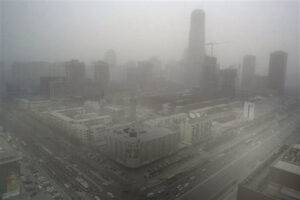Explosives experts are being drafted in at great cost by the Chinese authorities to determine how to avoid massive explosions in the combustible Beijing atmosphere. Naturally, with the volatile situation in Beijing’s poisonous atmosphere, all naked flames may be banned from the games.
“We have a highly volatile cocktail of dangerous explosive gases in the Beijing atmosphere and to avoid a massive chain reaction leading to a massive explosion, we may have to ban the Olympic flame from being displayed at the games.” Gerald Matheson of JCP Consulting told an AP press conference on Monday.
The Beijing air is filled with heavy metals and phosphates that are hazardous to the health if breathed in.
There are also pockets of extremely volatile gases that are released daily from the numerous factories in the city. It was only three months ago when 267 people were killed when a housewife lit a cigarette in an open air cafe thus igniting a pocket of explosive gas that had just drifted over to where she was sitting, the resultant explosion demolished a mall and was seen 5 miles away.
According to the European Space Agency, Beijing and its neighbouring
north-east Chinese provinces have the planet’s worst levels of nitrogen
dioxide, which can cause fatal damage to the lungs.
If you breathe the highly toxic combustible soup that is Beijing’s air you would also be breathing in: Methane, Propane, Butane, Hexane, Heptane, Acetylene, Gasoline, Jet Fuel, Naptha, Turpentine, Toluene, Exlene, Ethylene Oxide, Acetone, Methyl Ethyl Ketone, Carbon Monoxide, Hydrogen Sulfide, Ammonia, Hydrogen.
Low visibility has also been an issue with some runners training for the marathon. Last week twenty athletes were not able to see where they were running and found themselves either lost or injured after running into concrete walls or lamp posts.
Nevertheless, Chinese Olympic officials wish to still go ahead with attempting to display an Olympic flame and are now toying with the idea of utilising a large video screen showing composite footage of all past Olympic flames to make up for the loss of the real flame.







